
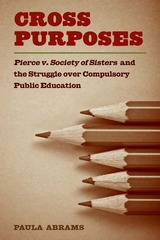
"A definitive study of an extremely important, though curiously neglected, Supreme Court decision, Pierce v. Society of Sisters."
---Robert O'Neil, Professor of Law Emeritus, University of Virginia School of Law
---Richard W. Garnett, Professor of Law and Associate Dean, Notre Dame Law School
"A well-written, well-researched blend of law, politics, and history."
---Joan DelFattore, Professor of English and Legal Studies, University of Delaware
In 1922, the people of Oregon passed legislation requiring all children to attend public schools. For the nativists and progressives who had campaigned for the Oregon School Bill, it marked the first victory in a national campaign to homogenize education---and ultimately the populace. Private schools, both secular and religious, vowed to challenge the law. The Catholic Church, the largest provider of private education in the country and the primary target of the Ku Klux Klan campaign, stepped forward to lead the fight all the way to the U.S. Supreme Court.
In Pierce v. Society of Sisters (1925), the court declared the Oregon School Bill unconstitutional and ruled that parents have the right to determine how their children should be educated. Since then, Pierce has provided a precedent in many cases pitting parents against the state.
Paula Abrams is Professor of Constitutional Law at Lewis & Clark Law School.
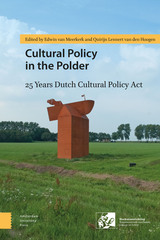
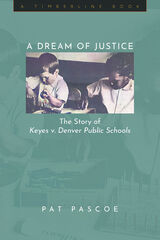
Pascoe details Denver’s desegregation battle, beginning with the citizen studies that exposed the inequities of segregated schools and Rachel Noel’s resolution to integrate the system, followed by the momentous pro-integration Benton-Pascoe campaign of Ed Benton and Monte Pascoe for the school board in 1969. When segregationists won that election and reversed the integration plan for northeast Denver, Black, white, and Latino parents filed Keyes v. School District No. 1. This book follows the arguments in the case through briefs, transcripts, and decisions from district court to the Supreme Court of the United States and back, to its ultimate order to desegregate all Denver schools “root and branch.” It was the first northern city desegregation suit to be brought before the Supreme Court. However, with the end of court-ordered busing in 1995, schools quickly resegregated and are now more segregated than before Keyes was filed.
Pascoe asserts that school integration is a necessary step toward eliminating systemic racism in our country and should be the objective of every school board. A Dream of Justice will appeal to students, scholars, and readers interested in the history of civil rights in America, Denver history, and the history of US education.
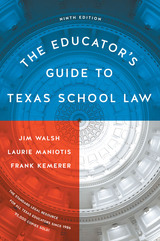
Much has changed in the area of school law since the first edition of The Educator’s Guide was published in 1986. This new ninth edition offers an authoritative source on all major dimensions of Texas school law through the 2017 legislative sessions. Intended for educators, school board members, interested attorneys, and taxpayers, the ninth edition explains what the law is and what the implications are for effective school operations. It is designed to help professional educators avoid expensive and time-consuming lawsuits by taking effective preventive action. It is an especially valuable resource for school law courses and staff development sessions.
The ninth edition begins with a review of the legal structure of the Texas school system, incorporating recent innovative features such as charter schools and districts of innovation. Successive chapters address attendance, the instructional program, service to students with special needs, the rights of public school employees, the role of religion, student discipline, governmental transparency, privacy, parent rights, and the parameters of legal liability for schools and school personnel. The book includes discussion of major federal legislation, such as the Individuals with Disabilities Education Act, the Family Educational Rights and Privacy Act, Section 504 of the Rehabilitation Act of 1973, and the Every Student Succeeds Act. On the state level, the book incorporates new laws pertaining to cyberbullying and inappropriate relationships between students and employees. Key points are illustrated through case law, and a complete index of case citations is included.
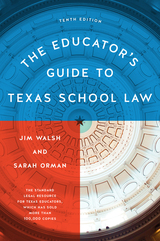
Much has changed in the area of school law since the first edition of The Educator’s Guide to Texas School Law was published in 1986. This new tenth edition of The Educator’s Guide offers an authoritative source on Texas school law through the 2021 legislative sessions. Intended for educators, school board members, attorneys, and taxpayers, it explains what the law is and what the implications are for effective school operations; it helps professional educators avoid expensive and time-consuming lawsuits by taking effective preventive action; and it serves as a highly valuable resource for school law courses and staff development sessions.
The tenth edition begins with a review of the legal structure of the Texas school system, incorporating recent features such as charter schools and districts of innovation, then addresses the instructional program, service to students with special needs, the rights of public school employees, the role of religion, student discipline, governmental transparency, privacy, parental rights, and the parameters of legal liability for schools and school personnel. The book includes discussion of major federal legislation, such as the Individuals with Disabilities Education Act, the Family Educational Rights and Privacy Act, Section 504 of the Rehabilitation Act of 1973, and Title IX. On the state level, the book incorporates laws pertaining to cyberbullying, inappropriate relationships between students and employees, and human sexuality instruction.
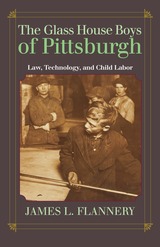
By the turn of the century, most states had enacted laws banning children from working at night, and coupled with compulsory education requirements, had greatly reduced the use of children in industry. In western Pennsylvania, however, child labor was deeply entrenched, and Pennsylvania lawmakers lagged far behind the rest of the nation. In The Glass House Boys of Pittsburgh, James L. Flannery presents an original and compelling examination of legislative clashes over the singular issue of the glass house boys. He reveals the many societal, economic, and political factors at work that allowed for the perpetuation of child labor in this industry and region.
Through extensive research in Pennsylvania state legislature archives, National Child Labor Committee reports, and union and industry journals, Flannery uncovers a complex web of collusion between union representatives, industrialists, and legislators that kept child labor reform at bay. Despite national pressure, a concerted effort by reformers, and changes to education laws, the slow defeat of the “glass house exception” in 1915 came about primarily because of technological advances in the glass bottle industry that limited the need for child labor.
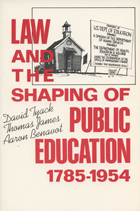
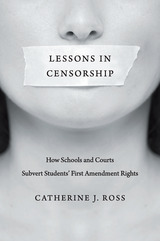
American public schools often censor controversial student speech that the Constitution protects. Lessons in Censorship brings clarity to a bewildering array of court rulings that define the speech rights of young citizens in the school setting. Catherine J. Ross examines disputes that have erupted in our schools and courts over the civil rights movement, war and peace, rights for LGBTs, abortion, immigration, evangelical proselytizing, and the Confederate flag. She argues that the failure of schools to respect civil liberties betrays their educational mission and threatens democracy.
From the 1940s through the Warren years, the Supreme Court celebrated free expression and emphasized the role of schools in cultivating liberty. But the Burger, Rehnquist, and Roberts courts retreated from that vision, curtailing certain categories of student speech in the name of order and authority. Drawing on hundreds of lower court decisions, Ross shows how some judges either misunderstand the law or decline to rein in censorship that is clearly unconstitutional, and she powerfully demonstrates the continuing vitality of the Supreme Court’s initial affirmation of students’ expressive rights. Placing these battles in their social and historical context, Ross introduces us to the young protesters, journalists, and artists at the center of these stories.
Lessons in Censorship highlights the troubling and growing tendency of schools to clamp down on off-campus speech such as texting and sexting and reveals how well-intentioned measures to counter verbal bullying and hate speech may impinge on free speech. Throughout, Ross proposes ways to protect free expression without disrupting education.
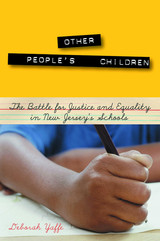
Winner of the 2008 NJ Studies Academic Alliance author's award for an outstanding non-fiction work about New Jersey
In 1981, when Raymond Abbott was a twelve-year-old sixth-grader in Camden, New Jersey, poor city school districts like his spent 25 percent less per student than the state’s wealthy suburbs did. That year, Abbott became the lead plaintiff in a landmark class-action lawsuit demanding that the state provide equal funding for rich and poor schools. Over the next twenty-five years, as the non-profit law firm representing the plaintiffs won ruling after ruling from the New Jersey Supreme Court, Abbott dropped out of school, fought a cocaine addiction, and spent time in prison before turning his life around.
Raymond Abbott’s is just one of the many human stories that have too often been forgotten in the policy battles New Jersey has waged for two generations over equal funding for rich and poor schools. Other People’s Children, the first book to tell the story of this decades-long school funding battle, interweaves the public story—an account of legal and political wrangling over laws and money—with the private stories of the inner-city children who were named plaintiffs in the state’s two school funding lawsuits, Robinson v. Cahill and Abbott v. Burke. Although these cases have shaped New Jersey’s fiscal and political landscape since the 1970s, most recently in legislative arguments over tax reform, the debate has often been too abstract and technical for most citizens to understand. Written in an accessible style and based on dozens of interviews with lawyers, politicians, and the plaintiffs themselves, Other People’s Children crystallizes the arguments and clarifies the issues for general readers.
Beyond its implications for New Jersey, this book is an important contribution to the conversations taking place in all states about the nation’s responsibility for its poor, and the role of public schools in providing equal opportunities and promising upward mobility for hard-working citizens, regardless of race or class.
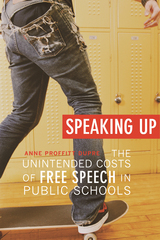
Just how much freedom of speech should high school students have? Does giving children and adolescents a far-reaching right of expression, without joining it to responsibility, ultimately result in an asylum that is run by its inmates?
Since the late 1960s, the United States Supreme Court has struggled to clarify the contours of constitutionally guaranteed freedom of speech rights for students. But as this thought-provoking book contends, these court opinions have pitted students—and their litigious parents—against schools while undermining the schools’ necessary disciplinary authority.
In a clear and lively style, sprinkled with wry humor, Anne Proffitt Dupre examines the way courts have wrestled with student expression in school. These fascinating cases deal with political protest, speech codes, student newspapers, book banning in school libraries, and the long-standing struggle over school prayer. Dupre also devotes an entire chapter to teacher speech rights. In the final chapter on the 2007 “Bong Hits 4 Jesus” case, she asks what many people probably wondered: when the Supreme Court gave teenagers the right to wear black armbands in school to protest the Vietnam War, just how far does this right go? Did the Court also give students who just wanted to provoke their principal the right to post signs advocating drug use?
Each chapter is full of insight into famous decisions and the inner workings of the courts. Speaking Up offers eye-opening history for students, teachers, lawyers, and parents seeking to understand how the law attempts to balance order and freedom in schools.
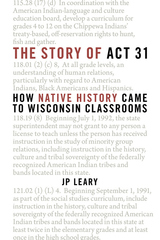
Since its passage in 1989, a state law known as Act 31 requires that all students in Wisconsin learn about the history, culture, and tribal sovereignty of Wisconsin’s federally recognized tribes.
The Story of Act 31 tells the story of the law’s inception—tracing its origins to a court decision in 1983 that affirmed American Indian hunting and fishing treaty rights in Wisconsin, and to the violent public outcry that followed the court’s decision. Author J P Leary paints a picture of controversy stemming from past policy decisions that denied generations of Wisconsin students the opportunity to learn about tribal history.
READERS
Browse our collection.
PUBLISHERS
See BiblioVault's publisher services.
STUDENT SERVICES
Files for college accessibility offices.
UChicago Accessibility Resources
home | accessibility | search | about | contact us
BiblioVault ® 2001 - 2024
The University of Chicago Press









